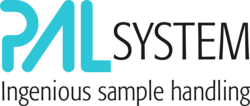Food and feed analysis is a highly challenging task due to the different chemical nature and high number of analytes in complex samples. Food safety analysis follows strict governmental regulations for the control of maximum residue limits globally.
The PAL System as the industry standard front-end for GC/MS and LC/MS offers proven automated sample prep solutions. The PAL workflows for food and feed analysis follow the internationally published standard methods, often micromethods are applied for a safer green analytical chemistry.
Within the long list of monitored contaminants are pesticides using the QuECHERS extraction and micro-SPE (µSPE) clean-up for a wide range of food commodities. Also, the automated µSPE clean-up is applied for the analysis of veterinary drugs, residues of antibiotics and hormones. Highly polar pesticides like glyphosate and AMPA are analyzed using online-SPE technique on the PAL System.
For the analysis of volatile compounds like solvents or flavor compounds the PAL System offers tools for static and dynamic headspace analysis (ITEX DHS).
Solid phase microextraction technique (SPME) with SPME Fibers or the rugged SPME Arrow are used for all areas in the food industry and quality control such as beverages, meat, oils, vegetables, wine, and food contact materials.
The PAL System provides fully automated sample preparation methods for the monitoring of processing contaminations in the vegetable oil industry, analysis for adulteration by blending, or the transfer of mineral oil hydrocarbons (MOSH, MOAH).
Other important applications include the characterization of fat content, composition, nutritional value, or cis/trans-isomerism. The PAL System offers automated extraction, saponification, derivatization and online GC injection in 24/7 operation.
The steadily growing demand for food and feed analysis calls for the PAL System to provide automated solutions for high sample throughput, reproducible and error free sample preparation.
Discover our and our partners ready-to-go workflows.
High-Throughput Mega-Method for the Analysis of Pesticides, Veterinary Drugs, and Environmental Contaminants by UHPLCMS/ MS and Robotic Mini-SPE Cleanup + LPGC-MS/MS, Part 1: Beef
Keywords: pesticides, veterinary drugs, environmental contaminanst, QuEChERS, GC-MS, LC-MS, beef
J. Agric. Food Chem. (2020)
Quantification of allergenic plant traces in baked products by targeted proteomics using isotope marked peptides
Keywords: Allergenic food, plant allergen (soy, sesame, lupine), LC-MS/MS, quantification of allergenic plant traces, food labeling
Food Sci. Technol. (2016), 74, 286-93
Automated Mini-Column Solid-Phase Extraction Cleanup for High-Throughput Analysis of Chemical Contaminants in Foods by Low-Pressure Gas Chromatography—Tandem Mass Spectrometry
Keywords: High-throughput automation, solid-phase extraction, cleanup, pesticide residue analysis, QuEChERS sample preparation, fast GC-MS/MS, analyte protectants, environmental contaminants, foods
Chromatographia (2016) DOI:10.1007/s10337-016-3116-y
Determination of sulfur and nitrogen compounds during the processing of dry fermented sausages and their relation to amino acid generation
Keywords: Sulfur, nitrogen, volatile compound, amino acid, odor-active compound, sausage, solvent assisted flavor evaporation
Food Chem, 190 (2016) 657-664
Development of an Automated Column Solid-Phase Extraction Cleanup of QuEChERS Extracts, Using a Zirconia-Based Sorbent, for Pesticide Residue Analyses by LC-MS/MS.
Keywords: QuEChERS, micro SPE, LC-MS/MS, ITSP, µSPE, Z-Sep, zirconia, pesticide, multiresidue, avocado, citrus
J Agric Food Chem, 2015, 63(21) 5107-19
Universal Route to Polycyclic Aromatic Hydrocarbon Analysis in Foodstuff: Two-Dimensional Heart-Cut Liquid Chromatography−Gas Chromatography−Mass Spectrometry
Keywords: PAHs, polycyclic aromatic hydrocarbons, 2D LCxGC-MS, food
Anal Chem 2015 87(12):6195-203
Determination of Wine Aroma Compounds by Head Space “In tube extraction” Technique and Gas Chromatography (HS-ITEX-GC/MS)
Keywords: White wine, aroma compounds, vintage influence, ITEX, GC/MS
Bulletin UASVM Food Science and Technology 72(1) / 2015 (OPEN ACCESS)
Enantiodifferentiation of 3-sec-butyl-2-methoxypyrazine in different species using multidimensional and comprehensive two-dimensional gas chromatographic approaches.
Keywords: 3-sec-Butyl-2-methoxypyrazine, heart-cutmultidimensional gas chromatography, comprehensive two-dimensional gas chromatography, mass spectrometric detection, enantiodifferentiation
Anal. Bioanal. Chem. 2015, 407, 253-63
In-Tube Extraction-GC/MS as High Capacity Enrichment Technique for the Analysis of Alcoholic Beverages.
Keywords: ITEX, microextraction, GC/MS, volatile constituents, beer varieties
J. Agric. Food Chem. 2014, 62 (14), 3081–3091
Chemometric Discrimination of Different Tomato Cultivars Based on Their Volatile Fingerprint in Relation to Lycopene and Total Phenolics Content
Keywords: Anti-oxidant capacity, in-tube extraction ITEX, PCA, phenolic compounds, tomatoes, volatiles
Phytochem. Anal. 2014, 25 (2), 161-9
Unravelling ionization and fragmentation pathways of carotenoids using orbitrap technology: a first step towards identification of unknowns
Keywords: carotenoids, orbitrap, ionization, fragmentation, identification
J. Mass Spectrom. 2013, 48, 740-754
In-tube Extraction and GC-MS Analysis of Volatiile Components from Wild and Cultivated sea buchthorn (Hippohae rhamnoides L. ssp. Carpatica) Berry Varieties and Juice
Keywords: GC-MS, in-tube extraction ITEX, principal component analysis, volatiles, sea buckthorn fruit
Phytochem. Anal. 2013, 24, 319-328
Caffeine in Your Drink: Natural or Synthetic?
Keywords: compound-specific isotope Analysis (CSIA), high-temperature reversed-phase liquid chromatography isotope ratio mass spectrometry, HT-RPLC/IRMS
Anal. Chem. 2012, 84, 2805−2810
Automated and quantitative headspace in-tube extraction for the accurate determination of highly volatile compounds from wines and beers
Keywords: ITEX, GC, wine, beer
J. Chromatography A, 1230 (2012) 1– 7
Characterization of Novel Varietal Floral Hop Aromas by Headspace Solid Phase Microextraction and Gas Chromatography−Mass Spectrometry/Olfactometry
Keywords: SPME, GC-MS
J Agric Food Chem. 2012; 60: 12270−12281
Aroma chemical composition of red wines from different price categories and its relationship to quality.
Keywords: wine aroma compounds, odorant composition, GC/MS
J Agric Food Chem. 2012; 60:5045-56
Rapid enrichment of bioactive milk proteins and iterative, consolidated protein identification by multidimensional protein identification technology
Proteomics 2005, 5, 3836–3846

















